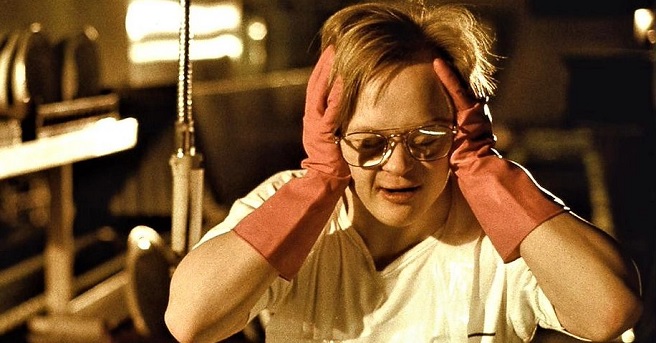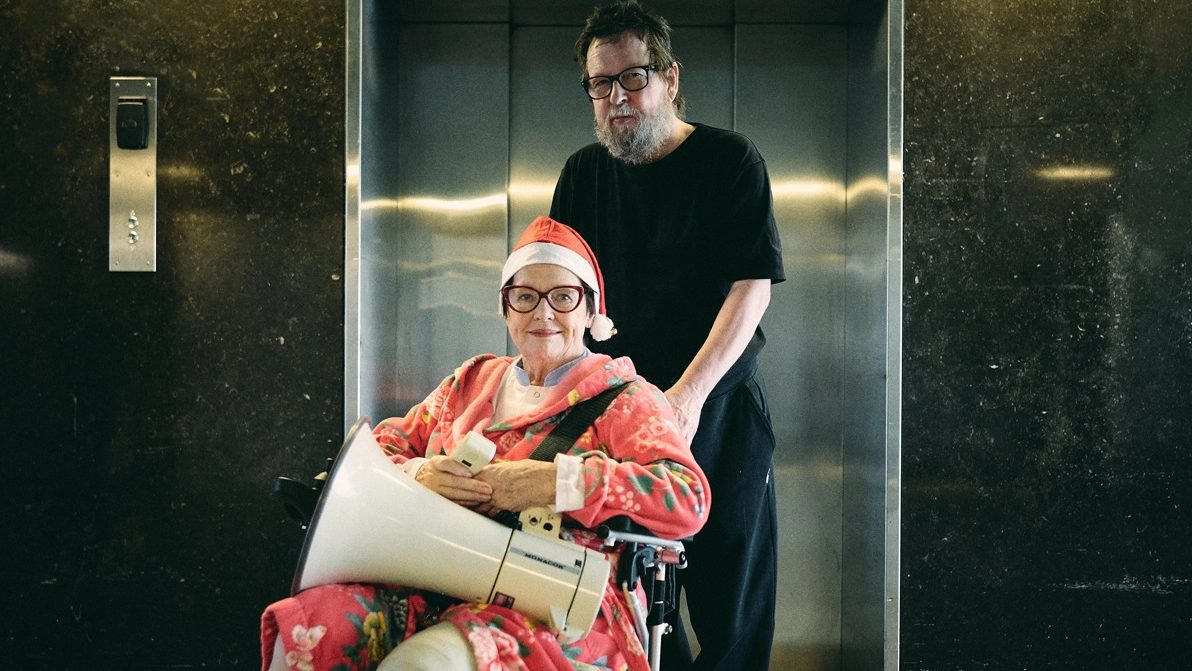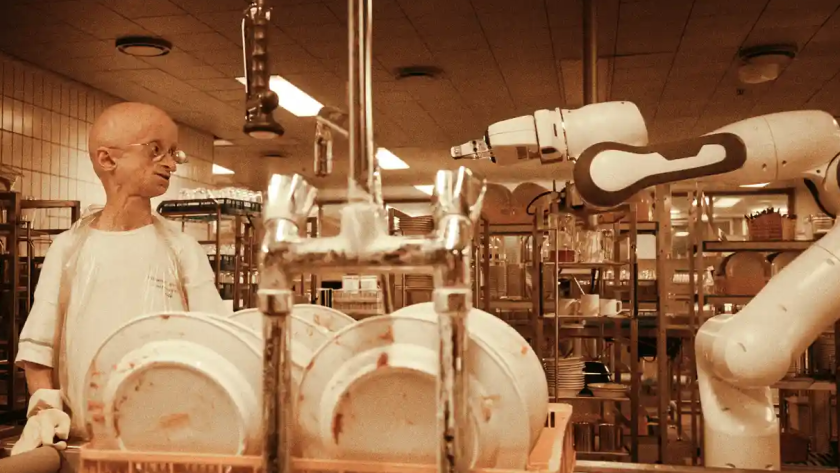The FilmSoc Journal is back for the the 79th edition of Venice film festival, with critic Aryan Tauqeer delivering a look at the hits and misses of the 2022-23 season.
◯ Warning: this review contains spoilers.
Aryan Tauqeer reviews Lars von Trier’s The Kingdom Exodus: the third season of his Danish supernatural drama series, which premiered its first season 25 years ago.
28 years ago, von Trier’s Riget (also known as The Kingdom) hit Danish television sets across the country, setting the stage for a tapestry of slapstick comedy, workplace drama and body horror that cemented the endlessly incendiary filmmaker as an architect of grandiose and grostesque vision- not unlike Lynch’s Twin Peaks, which premiered 4 years prior to The Kingdom and acted as one of the key influences on the show’s form and aesthetic. One need only observe how each episode of the original series ends with Von Trier clad in a sharp black tuxedo against the backdrop of a red curtain, personally thanking viewers for continuing embarking on a journey throughout The Kingdom (and typically with a macabre object, including decapitated heads and newly removed hearts, in either hand) to deduce the extent that Twin Peaks impacted Von Trier’s series. Much like how the uneven second season of Twin Peaks ended on a deeply unsettling cliffhanger, forecasting a paradigm shift towards the domination of the unknowable supernatural over (seemingly) ontologically pure humanism, the second season of von Trier’s series ended on a similarly foreboding note, albeit with apocalyptic rather than simply personal implications. Just as Lynch awoke the town of Twin Peaks with The Return in 2017, recontextualising the ostensible homely warmth of the original series as a hollow façade of nostalgia whose resurrection bears fatal consequences, The Kingdom: Exodus resurrects the spirit of the Rigshospitalet (in both literal and figurative terms) in a revival that remains as wryly amusing as the original series, but brings with it the spectre of mortality- an invaluable example of Late Style that harkens to von Trier’s Dogme 95 origins.

“It’s just a stupid TV show” remarks Karen, the outsider through whose eyes the majority of Exodus is experienced. Reprimanding herself for giving in to her imagination, she sinks into slumber once again, as her catatonic self stumbles towards the gates of the hospital that served as the original series’ haunted house. Following an auteurist tendency towards metatextual reflection on the careers of their creators, the original series is dismissed as a mere DVD farce that almost everyone in Exodus seems to have seen. The pointed dismissal directed by the doctors, assistants and patients occupying the hospital towards The Kingdom is conveyed in much the same way as contemporary audiences balk at the beating of the dead horse that is Grey’s Anatomy; one of the more amusing expressions of this sentiment is voiced by series regular Judith Petersen (Birgitte Raaberg), who scathingly refers to the unsatisfactory ending of the season two of The Kingdom as being the fault of “that idiot von Trier”. In a similar fashion, key dramatic lynchpins of the first two seasons are reduced to recurring instances of comic relief, from Rigmor Mortensen (Ghita Nørby) becoming something of a cuckoo who makes her presence known (to the dread of the hospital staff) by singing “yoo hoo”, to Hook (Søren Pilmark), who goes from an orchestrator of both order and chaos to a fleeting vision capped by a green mohawk. Even the legacy of the hospital’s Dane-despising Swedish head, Stig Helmer (Ernst-Hugo Järegård) is mocked through the introduction of his equally bigoted son. Though such recontextualisations have proven to be more exasperating than not, the maintenance of Von Trier’s pitch-black comedy as a series regular of its own situates them as mere elements a wider framework of dryly comic satire.
The extent of von Trier’s satirization of petty workplace politics, however, is compensated in equal terms by Exodus’ sincerity towards the supernatural. In the original series, the sallow, sickly colour grading and noisy digital textures encapsulated succinctly the atmosphere of decay that permeated the hospital’s walls- not just in the rotting of bodies in the morgue or the cracks in the elevator, but also the distinctly material presence of otherworldly beings. Its walls were populated by satanic cults, ghosts of dead patients and one absurdly large mutant baby by the name of Little Brother, all of whom disrupted the ribald escapades of The Kingdom’s ensemble cast through jolting tonal shifts. In the original series, this disruption manifested itself in the form of a fracturing of phenomenology, where the hospital’s leadership refused to concede any of their strictly objectivist theoretical ground to the possibility that the supernatural was beginning to infringe upon it. Exodus sacrifices much of this debate in service of a less conflicted view of the supernatural, instead choosing to situate the realm of the supernatural as an entirely separate sphere rather than one embedded within the hospital. Though this digression loses much of what made the progression of decay in the prior two seasons compelling, it also allows for a more earnest emotional engagement than the somewhat hackneyed romances of prior episodes. As nihilistic as Exodus may be, it does not fully relinquish nostalgia, instead choosing to position the manic chaos of The Kingdom’s first two seasons as the whirlwind of relative youth (in contrast to the slow funeral dirge that is Exodus) that its characters long for. A descent into the ghostly marsh upon which the hospital was built yields a dreamlike sequence in a marsh not unlike that of the hellish descent in The House that Jack Built, where a parent’s confrontation with the spectre of their dead son seems almost an allegory for von Trier’s own wrestling with mortality.

Make no mistake, however- though it brings with it a softened emotional edge, von Trier’s deeply demented medical odyssey remains no less sharply amusing, nor any less uncompromising in its refusal to provide any easy answers to the moral quandaries it posits, than when it first premiered 28 years ago. Though (due to circumstances involving his health) von Trier no longer appears at the end of each episode as guide to the River Styx that is Rigshospitalet, his machinations as a trickster are evident in every frame. As the show opens with a widened aspect ratio shot in the cold, objective style of his contemporary work, the director seems to lure the audience into presupposing that Exodus will mark a drastic departure from the prior two seasons. Within a matter of minutes, however, the ominous narration of the intro and its endlessly hummable theme submerses the audience in the atmosphere of the original series. This veneer of familiarity allows for the heightening of the delightfully scandalous interpersonal drama to even more absurd heights, including a particularly memorable guest appearance by Alexander Skarsgard as a civil rights lawyer who works out of the women’s toilets. In a similar vein, the personalities of the new generation of hospital staff seem even more outsized than The Kingdom’s original cast- when a recurring bit of everyday body horror/grotesque party trick involving the temperamental neurosurgeon Filip’s (Nikolaj Lie Kaas) ability to partly remove his eyeballs from his sockets becomes a source of perverse, tragic horror in the series finale, one is struck by the feeling that von Trier is playing a grand joke on the audience. This is not, however, to its detriment at all- to the contrary, it serves as the foundation for both formal and narrative experimentation that could not be achieved without destroying any expectations of what a long-awaited continuation of The Kingdom would look like. As Exodus progresses from fiasco to fiasco, the already tenuous seams of reality binding the walls of the hospital begin to tear apart, leading to every hilariously petty conflict being contrasted immediately with some of the most deeply unsettling images of von Trier’s career. It is precisely this seamless blending of the horrific with the hilarious that renders Exodus’ weighty ambitions fruitful.
Perhaps the most suitable summation of what The Kingdom: Exodus is can be found in the words of the man behind the madness. At the end of every episode of the original series, von Trier (standing in front of a bright red curtain) parted with the audience by reminding them that in order to engage with The Kingdom fully, they would have to “take the good with the evil”. In Exodus, the barriers dividing the two into distinct categories disintegrate as von Trier retreats behind the red curtain, content to leave questions unanswered and the characters to fend for themselves-if a god exists in the world of The Kingdom, one would suppose that he has an especially sadistic sense of humour. The audience, meanwhile, is simply along for the ride-whether they like it or not.
The Kingdom: Exodus will be released on Mubi on 27th November, 2022. Watch the trailer here:




